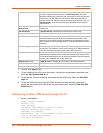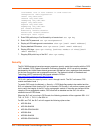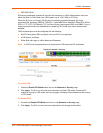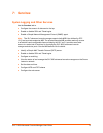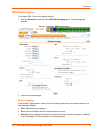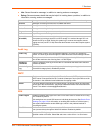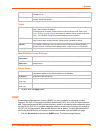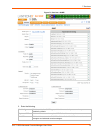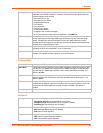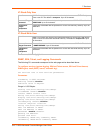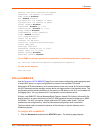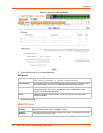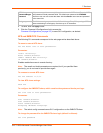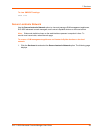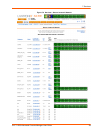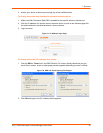
7: Services
SLC™ 8000 Advanced Console Manager User Guide 80
Communities
Version 3
Enable Traps Traps are notifications of certain critical events. Disabled by default. This feature is
applicable when SNMP is enabled. Examples of traps that the SLC 8000 advanced
console manager sends include:
Ethernet Port Link Up
Ethernet Port Link Down
Authentication Failure
SLC Booted
SLC Shutdown
Device Port Logging
Power Supply Status
Sysadmin user password changed
The SLC unit sends the traps to the host identified in the NMS field.
NMS #1 (or #2) When SNMP is enabled, an NMS (Network Management System) acts as a central
server, requesting and receiving SNMP-type information from any computer using
SNMP. The NMS can request information from the SLC 8000 advanced console
manager and receive traps from the SLC unit. Enter the IP address of the NMS server.
Required if you selected Enable Traps.
Location Physical location of the SLC 8000 advanced console manager (optional). Useful for
managing the SLC unit using SNMP. Up to 20 characters.
Contact Description of the person responsible for maintaining the SLC 8000 advanced console
manager, for example, a name (optional). Up to 20 characters.
Read-Only A string that SNMP agent provides. The default is public.
Read-Write A string that acts like a password for an SNMP manager to access the read-only data
from the SLC unit SNMP, like a password for an SNMP manager to access the read-
only data the SLC SNMP agent provides, and to modify data where permitted. The
default is private.
Trap The trap used for outgoing generic and enterprise traps. Traps sent with the Event
trigger mechanism still use the trap community specified with the Event action. The
default is public.
Enable v1/v2 If checked, SNMP version 1 and version 2 (which use the Read-Only and Read-Write
Communities) is enabled. Uncheck to only allow the more secure version 3 to be used
to access the SLC 8000 advanced console manager via SNMP. The default is
enabled.
Alarm Delay Number of seconds delay between outgoing SNMP traps.
Security Levels of security available with SNMP v. 3.
No Auth/No Encrypt: No authentication or encryption.
Auth/No Encrypt: Authentication but no encryption. (default)
Auth/Encrypt: Authentication and encryption.
Auth with For Auth/No Encryp or Auth/Encrypt, the authentication method:
MD5: Message-Digest algorithm 5 (default)
SHA: Secure Hash Algorithm
Encrypt with Encryption standard to use:
DES: Data Encryption Standard (default)
AES: Advanced Encryption Standard



